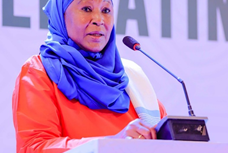By Fionah Barbra Agaba
*Kente’s (not real name) natural charm and friendly demeanour enabled her to connect with her colleagues at her new workplace. The usual big girl doing big girl things vibe! However, her boss, a senior executive known for his charismatic leadership, started showing an inappropriate level of interest in her. He frequently steered the conversations towards personal topics and often commented on the way her behind appeared in her dresses. This wasn’t the first time something of this nature occurred; she had found herself in a similar situation circa her undergraduate years with her male classmates. What Kente was dealing with was what has come to be termed as the male gaze.

The male gaze, first articulated by film theorist Laura Mulvey in 1975, is a term to describe the way visual arts and literature often depict the world and women from a masculine, heterosexual perspective. It extends beyond media into everyday interactions, profoundly affecting women, including those in higher education and professional settings.
A study, “Unmasking the male gaze and its effects on female students: a case study of Makerere University” conducted by Alfred Andama explored the impact of the male gaze on female students within the institution. His findings from 84 students revealed that the male gaze manifested through men's comments and judgments on women's appearance, imposing expectations that objectified and subordinated female students. This objectification was linked to a desire to control and possess women's bodies. Power relations play a crucial role in understanding the male gaze. It is not just about who looks at whom; it's also about the power dynamics embedded in these interactions. While the idea of the male gaze might seem abstract, its impacts are tangible, influencing self-esteem, academic performance, and professional advancement.
In professional settings, it’s that random comment on your weight and how it sits in the right spots (the loose equivalent of a random man on Kampala Road grabbing your wrist and whispering “size yange” into your ear). Its manifestation varies and for one to identify it, you must learn to read the subtle signs. It’s in the prolonged unsolicited eye contact, invasive scrutiny of one's body, or lingering looks. In meetings or classroom discussions, women may be interrupted or talked over more frequently than their male counterparts. Comments that focus excessively on a woman's appearance rather than her professional skills or academic achievements are another indicator.

Drawing the line in the sand
In the event you find yourself experiencing these series of unfortunate events, standing up for one’s self is needed to minimise the occurrence of male gaze and here are some clever ways to address it.
Document everything: Every single thing. Keep a record of instances where you feel the male gaze has affected you. Document the location, date, time, and nature of the incidents. This can provide concrete basis for addressing the issue with a supervisor or the human resources department if it escalates.
Assertive communication: This is another effective strategy you can apply. For example, if someone is blatantly staring at you or commenting on your appearance and it’s making you uncomfortable, address it directly but diplomatically.
Use feedback mechanisms: Take advantage of the feedback mechanisms of the institutions and companies you are in. Mechanisms like suggestion boxes and anonymous surveys are occasionally conducted to gauge the institutional/workplace climate and identify areas for improvement. You can use this to your advantage as your identity will remain anonymous and it can help in addressing issues before they become pervasive.
Confide in someone you trust: If symptoms persist, a problem shared is a problem half solved. This could be a family member, friend, colleague or mentor, who will advise you on the next steps to handle such situations. Many universities and workplaces now have women's groups or diversity and inclusion committees and human resource departments that can also offer support.
The combination of setting clear boundaries and establishing a solid professional reputation at your workplace will gradually shift the dynamics between you and your colleagues. Over time, these strategies will not only help you reclaim your confidence but also foster a more respectful and equitable school/work environment.
Related News
![]() Please join hands with the Makerere University Endowment Fund as it works towards attracting & retaining the best faculty, providing scholarships, and investing in cutting-edge research and technology.
Please join hands with the Makerere University Endowment Fund as it works towards attracting & retaining the best faculty, providing scholarships, and investing in cutting-edge research and technology.



